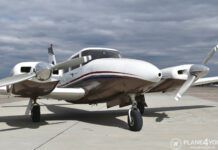
A stuffy, runny nose, burning eyes and a nagging headache are bad enough on the ground. But when you’re flying in the system—and can’t just pull over at a rest stop—allergy problems become compounded. If you follow the IMSAFE mnemonic, you should be OK. But if allergies are a constant issue and you need to go places, putting up with allergies are just a part of life as a pilot.
First, what are talking about? “Hay fever” is defined as “seasonal allergic rhinitis” by the National Institutes of Health. It’s characterized by the well-known symptoms of runny nose, bleary eyes and headache, and common responses include allergen avoidance, antihistamines—even injections in severe cases.
The “seasonal” part of this seasonal allergy syndrome is important. If you suffer attacks during peak pollen season you’ve probably got classic hay fever and you’ll have to soldier on ‘til the season changes and allergens in the air begin to dissipate. If your condition is chronic, causes can range from sinusitis to bronchitis. Close collaboration with your physician to find a cause and a solution is paramount.
The real challenge for the seasonal allergy sufferer is what to take and what to avoid: Consulting our sister website University Health News, we learn that there is no such thing as a non-drowsy antihistamine, despite overly encouraging advertising claims.

Antihistamines block the effects of chemical histamines that produce symptoms, but most medications offer solutions that are almost worse than the hay fever: meds-induced drowsiness, dry mouth, dizziness, blurred vision, even nausea. Commercial products like Zyrtec and Clarinex tout their non-drowsy attributes, but a 2014 study of International Journal of Psychiatry in Clinical Practice casts some doubt on any antihistamine’s ability to squelch allergy symptoms without causing drowsiness.
If you are a pilot and you suffer from seasonal allergies, University Health Newsoffers these helpful take-aways:
- Reduce exposure to allergens by showering off pollens and irritants every night.
- Use a neti potwith saline solution twice a day to rinse allergens from your sinuses.
- Equip your home with HEPA (high-efficiency particulate air) filters.
- Take other steps to allergy-proof your home, such as using dust-mite-proof pillow and mattress covers, keeping windows closed, using air conditioning during high-pollen days, keeping pets out of the bedroom and vacuuming twice a week.
- Take fish oil (1000 mg EPA/DHA per day), quercetin (500 mg twice a day), and n-acetyl-cysteine (400 mg twice a day) to boost your body’s ability to fight allergens.
- Eat foods from the sulforaphane-rich Brassica family (e.g., broccoli, cauliflower, kale, Brussels sprouts and cabbage) daily.
- Try taking an extract of the herb butterbur (50 mg three times a day). Comparisons of butterbur to prescription drugs such as fexofenadine (Allegra) and cetirizine (Zyrtec) have reported similar efficacy.
If your head is pounding, your nose is running nonstop and you feel the shakiness that comes with fever, listen to that Aunt Jane in your head and stay on the ground. Just like you wouldn’t penetrate IMC when you’re VFR, you want to avoid pushing into a situation that will cause nothing but grief.
Here are some more helpful links:

































